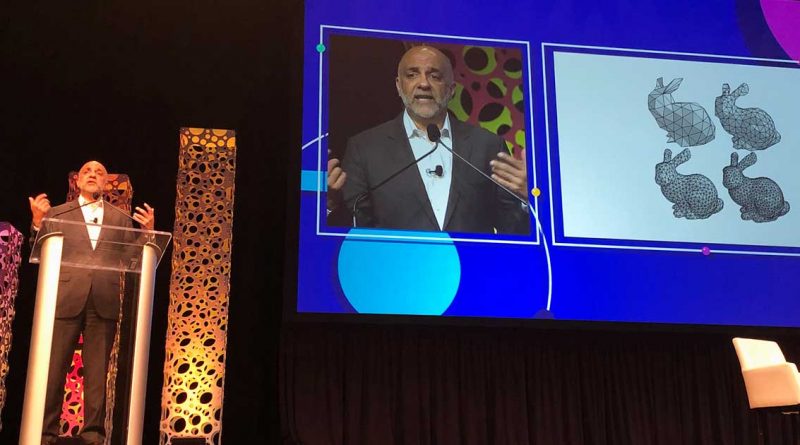ONC proposes new rules for Cures Act implementation, certifications and more
Photo: Mike Miliard/HIMSS Media
The Office of the National Coordinator for Health IT announced a new proposed rule on Tuesday, containing new statutory language for further implementation and certification criteria of the 21st Cures Act.
The rule – Health Data, Technology, and Interoperability: Certification Program Updates, Algorithm Transparency, and Information Sharing, or HTI-1 – will be published next week in the Federal Register.
WHY IT MATTERS
National Coordinator for Health IT Micky Tripathi, speaking at an online press conference announcing the new rule, said it was an exciting day for ONC to release the work on the rules around electronic health record certification and interoperability.
The new rule would address the foundational aspects of four key ONC priorities, he said: building the digital foundation of health record information; making interoperability easy; promoting information sharing and ensuring proper use of digital health tools.
According to ONC, some key proposals in the NPRM include:
- Making the Electronic Health Record Reporting Program a new condition of certification for developers of certified health IT.
- Expanding and modifying exceptions to information blocking regulations to support wider information sharing.
- Revising some certification criteria – including rules around clinical decision support, patient demographics and observations, electronic case reporting and APIs for patient and population services.
- Adopting the version 3 of the United States Core Data for Interoperability as a standard within ONC’s Certification Program – and establishing an expiration date for USCDI Version 1 as a certification standard for the program.
- Updating some standards and implementation specs adopted under the certification program to advance interoperability, support enhanced health IT functionality, and reduce burden and costs.
Tripathi also said ONC has been very focused on algorithmic transparency, working to help ensure trust in the clinical algorithms made available in commercial EHR products.
“When evidence-based and predictive decision support interventions include patient observations and demographics data, social determinants of health data and health status assessment data, the health IT modules enable a user to review these data as part of existing source attribute requirements,” said Tripathi.
He said ONC worked with the HHS Office for Civil Rights on incorporating rules against algorithmic bias in Section 1557 of the Affordable Care Act, which makes it unlawful for any healthcare provider who receives funding from the federal government to refuse to treat an individual, on a consistent definition of algorithms.
In relation to health equity considerations in HTI-1, the definition allows users to “operationalize” their understanding of an algorithm, he said – adding that aligning with OCR’s definition could help users figure out where there might be issues that could lead to the potential discriminatory output.
Tripathi also noted there may be potential future rulemaking around standards adoption and certification of HT-1. That could include changes around disincentives for healthcare providers out of compliance with information blocking rules.
“We anticipate that healthcare providers will express concern with the potential complexity of the approach,” HHS officials had said in 2022 in relation to those proposed rules.
In addition to ONC, the new proposed rule was developed with collaboration of several HHS departments, including the Agency for Healthcare Research and Quality, Food and Drug Administration, U.S. Department of Veterans Affairs and the Federal Trade Commission.
The public comment period for HTI-1 begins on April 18 and closes June 20.
THE LARGER TREND
“The HTI-1 proposed rule, released about three years after the ONC Cures Act Final Rule, builds on the monumental progress that has been made to support patients and providers across the care continuum,” said Elise Sweeney Anthony, executive director of policy at ONC, in a blog post expanding on today’s announcement.
Like many other ONC policy announcements in recent years, the publication in the federal register of HTI-1 on April 18 appears timed to coincide with next week’s 2023 HIMSS Annual Global Health Conference & Exhibition, where many HHS officials are set to appear.
That Tuesday, Tripathi is scheduled to speak alongside HHS Deputy Secretary Andrea Palm in a keynote session that promises “discussion about the department’s health IT priorities and continued efforts to enable the digital health care system of the future with information sharing as a standard of care and business.”
ON THE RECORD
“In addition to fulfilling important statutory obligations of the 21st Century Cures Act, implementing these provisions is critical to advancing interoperability, promoting health equity and supporting the expansion of appropriate access, exchange and use of electronic health information,” said Tripathi in a statement today about HTI-1.
Tina Manoharan will offer more detail in the HIMSS23 session “AI and Data Interoperability: A Symbiotic Relationship for Healthcare.” It is scheduled for Tuesday, April 18 at 4:15 p.m. – 5:15 p.m. CT at South Building, Level 4, room S401.
Source: Read Full Article



